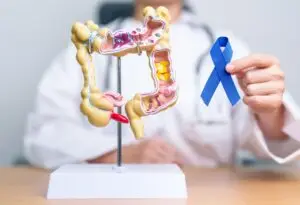Gut health has remained a mystery for decades – keeping many people suffering from digestive disorders confused, stressed out, unsure of what to eat, unsure of how to alleviate symptoms, and lost on how to get to the root cause of their issues. In this article, we’ll unearth some surprising facts about improving your gut health – so you no longer think your irritable bowel syndrome, bloating, or elimination issues are “all in your head.”
What is gut health and the gut microbiome?
“Gut health” has been a trendy topic in the health and wellness world, and for good reason: there’s evidence that the health of your gut represents the health of your entire body. The term “gut health” refers to the well-being of your digestive system, including the mouth, esophagus, stomach, liver, pancreas, gallbladder, large and small intestines, and your colon. What determines the health of this system is your gut microbiome – a community of trillions of bacteria, viruses and fungi that live in the digestive tract to help you break down food, absorb nutrients from that food, and boost your immune function.
A healthy gut microbiome is essential for preventing a variety of digestive ailments, including IBS, Crohn’s disease, acid reflux, diarrhea, and constipation. Beyond digestive health, an imbalanced gut can contribute to other diseases and health conditions. A compromised microbiome can lead to lowered immunity, making the body more susceptible to infections and illness.
What do harmful bacteria do in the gut microbiome?
There are always both healthy and unhealthy gut microbiome in your digestive system. However, you will develop gut dysbiosis when the scale tips and harmful bacteria reign. This condition is caused by an imbalance of more destructive than healthy gut bacteria, resulting in a myriad of digestive issues, causing a disruption of the gut microbiota ecosystem, disrupting the gut barrier, and creating an imbalance of the host immune and metabolic systems. Initially, this creates inflammation in the gut lining, bacterial infections such as H. pylori, SIBO (small intestinal bacterial overgrowth), inflammatory bowel conditions such as Crohn’s disease and ulcerative colitis, as well as general digestive upset, such as bloating, constipation, diarrhea, and gas. Additionally, this can prohibit healthy nutrient absorption (a big job of a healthy gut microbiome).
Good vs Bad Gut Bacteria: What’s the difference?
We all have both beneficial and harmful gut bacteria in our body. Problems hit, however, when there is a disturbance in the balance of healthy vs. harmful gut bacteria. Good gut bacteria aid in the digestive process, boost the immune system, provide essential vitamins, and help maintain the integrity of the gut lining. On the other hand, harmful bacteria do the opposite: they produce toxins that irritate and inflame the gut lining, weaken the immune system, leave the body more susceptible to disease, and interfere with proper nutrient absorption the body needs to thrive.
What are the symptoms of IBS?
Irritable bowel syndrome (IBS) is a common issue that affects millions, yet many people are left in the dark as to why they experience it. Common symptoms of IBS include:
- Abdominal pain and cramping often related to your bowel movements
- Difficulties with elimination, such as diarrhea, constipation or both
- Bloating and swelling
- Excessive gas
- An urgent need to use the bathroom
Learn more about symptoms, causes and solutions to improve your IBS.
How to Improve Gut Health
While there isn’t a one-size-fits-all solution for every individual, after refocusing on the gut microbiome and how the digestive system works, health experts now have a clearer view of how to resolve issues around IBS in most individuals.
Here are our top 10 solutions to improve your gut health:
- Dial in your diet: Processed food and excessive sugar will feed harmful bacteria. Change your diet so that you focus on eating more protein and whole foods rich in fiber such as whole grains, vegetables and fruits. Consider including prebiotics into your diet to help feed healthy gut bacteria, such as asparagus, garlic, or leeks.
Another important aspect of the diet is to include fermented foods daily that contain probiotics to help your gut flora thrive. Examples include: kefir, yogurt, miso, kimchi, and sauerkraut. You can also take probiotic supplements as your gut begins to heal. - Check for food intolerances: The reason why you may be experiencing gut issues in the first place is that you may be allergic, intolerant, or sensitive to certain foods (such as lactose or gluten). Try a food elimination diet or sign up for a food intolerance test. Your Forum Health provider can also conduct gastrointestinal effects testing to uncover potential gastrointestinal issues you may have. SIBO testing is another advanced diagnostic technique that helps to discover the root cause of your digestive woes.
- Manage stress: Stress and digestive health are intimately linked. The term “butterflies in my stomach” couldn’t be more true: the enteric nervous system resides in the gut and is directly linked to the brain. When we’re stressed, our gut health suffers. Prioritize daily self-care and time to regenerate and restore so you can manage stress healthily.
- Avoid taking antibiotics unnecessarily: As helpful as antibiotics can be when we need them, they wreak havoc on both harmful and helpful gut bacteria in the gut. Only take antibiotics when absolutely necessary as prescribed by your doctor.
- Quit smoking: Smokers get heartburn and peptic ulcers far more frequently than non-smokers. Smoking also increases the risk of Crohn’s disease and gallstones.
- Make exercise a part of your daily life: When you move your body, you keep the digestive system moving, too. This study proved that exercising 30-90 minutes, three times a week is likely to produce positive changes in the gut microbiome.
- Get enough sleep: A healthy night’s sleep (around 7-8 hours) produces melatonin and prolactin, both beneficial for contributing to a healthy gut microbiome.
- Limit alcohol and caffeine: Both caffeine and alcohol are highly acidic substances that can inflame the digestive system, as well as throw off healthy rest cycles that aid in good digestion. Swap your coffee for tea and limit alcoholic drinks (or abstain altogether).
- Eat slowly: An important principle in Ayurveda and Traditional Chinese Medicine is that it’s not always about what you eat but how you eat. Eat your meals undistracted and chew your food thoroughly, slowly, and mindfully. This helps the digestive system work much better, and you’ll be less stressed while eating, knowing the exact moment when you’re full.
- Hydrate: Drinking enough water throughout the day helps to soften your stool, helps flush food through your system, and helps tonify and keep your digestive system supple to do its job.
Ready to restore your gut health? Explore our gut health services and our gut detox program to jump-start your digestive health today.
FAQ
Irritable bowel syndrome (IBS) is a common issue that affects millions, yet many people are left in the dark as to why they experience it. Common symptoms of IBS include:
- Abdominal pain and cramping often related to your bowel movements
- Difficulties with elimination, such as diarrhea, constipation or both
- Bloating and swelling
- Excessive gas
- An urgent need to use the bathroom
Although similar, IBS and IBD are fundamentally very different. IBS or irritable bowel syndrome involves pain and discomfort around the abdominal area as well as having elimination issues (such as diarrhea or constipation) that comes and goes. IBD or inflammatory bowel disorder is a term for two conditions: Crohn's disease and ulcerative colitis that are characterized by chronic inflammation in the gut. This prolonged inflammation can cause more serious issues down the road.
Gut health supplements such as probiotics and prebiotics can be highly effective in improving gut health. However, it's better to get these benefits from your diet instead of supplementing for the long term. You can get prebiotics from foods such as asparagus, bananas, leeks, or garlic, and you can feed your daily probiotic needs from yogurt, kefir, miso, kraut, or other fermented foods where healthy bacteria thrive.
We’ve provided 11 of the best foods to restore gut health, including bone broth, fermented foods, collagen and much more.
There are many potential causes of IBS, including stress, food intolerances or allergies, not having enough healthy gut microbiome in the digestive tract, eating a poor diet or too much sugar, a lack of exercise, and not getting enough sleep are some of the main culprits.
To manage irritable bowel syndrome (IBS), doctors suggest modifying your diet and lifestyle, along with prescribing medications, probiotics, and mental health treatments. Finding the most effective approach may require trying various treatments. Forum Health can assist you in creating an appropriate treatment plan.
Find a Forum Health Clinic






